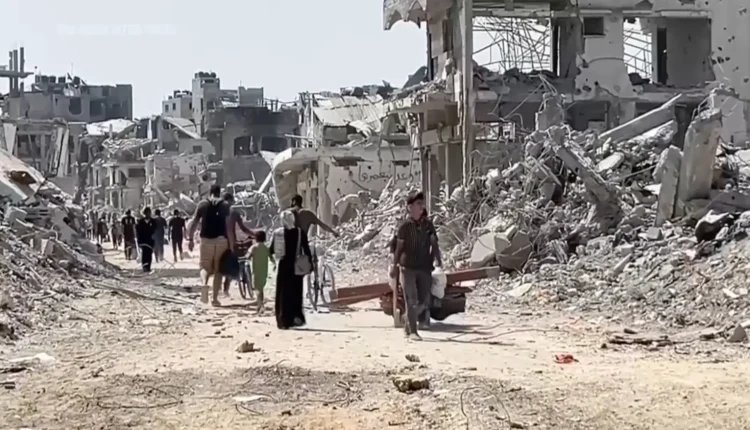Around 60 bodies were discovered beneath the rubble in a Gaza City neighbourhood, according to officials in the Hamas-controlled territory on Thursday.
This tragic finding follows Israel’s military announcement that it had concluded its operation in the area. The eastern district of Shujaiya experienced intense fighting, bombardment, and displacement, coinciding with ongoing truce and hostage release negotiations in Qatar.
U.S. President Joe Biden expressed optimism about the progress towards a ceasefire agreement, urging an end to the Israel-Hamas conflict. His remarks came after Israeli Prime Minister Benjamin Netanyahu insisted on Israel maintaining control of critical Gaza border areas with Egypt, a stance conflicting with Hamas’s demand for a complete Israeli withdrawal from Gaza.
Gaza’s civil defense agency reported finding approximately 60 bodies under the rubble in Shujaiya, following some of the heaviest combat in months. Hamas stated that Israel’s operation destroyed over 300 residential units and more than 100 businesses. Mohammed Nairi, a resident of Shujaiya, described returning to “immense destruction that defies description,” noting that all the houses were demolished.
Israel’s military announced the completion of its mission in Shujaiya on Wednesday after two weeks of operations, though bombardments and clashes continued in Gaza City. Witnesses observed tanks and troops moving to other city parts. An AFP correspondent reported air strikes in the Sabra neighborhood, while militants engaged Israeli forces in heavy clashes in Tel al-Hawa. Hamas reported 45 air strikes in the Gaza City area and Rafah, Gaza’s southernmost city, where Netanyahu indicated the war’s intense phase was nearing its conclusion.
Netanyahu’s office confirmed the return of its negotiating team, led by Mossad intelligence chief David Barnea, from talks with mediators in Doha. Netanyahu emphasized the necessity of controlling Gaza’s border with Egypt to prevent weapons from reaching Hamas and reiterated Israel’s commitment to continue fighting until its goals of destroying Hamas and securing the return of all hostages are met.
In Washington, Biden acknowledged the “difficult, complex issues” between Israel and Hamas but noted progress towards a ceasefire. “There’s a lot of things in retrospect I wish I had been able to convince the Israelis to do, but the bottom line is we have a chance now. It’s time to end this war,” he said after a NATO summit. The Washington Post reported that both Israel and Hamas had signalled their acceptance of an “interim governance” plan, wherein neither would rule the territory and a U.S.-trained force of Palestinian Authority supporters would provide security.
The Pentagon announced it would permanently end its problematic aid delivery effort to Gaza by sea from Cyprus. The UN’s health agency reported that only five trucks carrying medical supplies were allowed into Gaza last week. WHO chief Tedros Adhanom Ghebreyesus mentioned that over 34 trucks are waiting at the Al Arish crossing, with 850 pallets of medical supplies awaiting collection, and an additional 40 trucks are waiting at Ismailiya in Egypt.
Hamas’s October 7 attack on southern Israel, which triggered the war, resulted in the deaths of 1,195 people, mostly civilians. The militants also took hostages, 116 of whom remain in Gaza, including 42 believed dead. Israel’s military response has killed at least 38,345 people in Gaza, primarily civilians, according to Gaza’s health ministry.
The Israeli army issued leaflets on Wednesday warning Gaza City residents that the area remains a “dangerous combat zone” and urged them to flee, outlining designated escape routes. The UN stated that the latest evacuations would “only fuel mass suffering” for many already displaced Palestinian families facing “critical levels of need.”
Hamas official Hossam Badran asserted that Israel hopes to compel the resistance to relinquish its legitimate demands in truce negotiations. However, the continuation of massacres compels adherence to these demands. Israel’s military operations continued in Rafah, with dozens of militants reportedly killed in the past day. The military responded with air and ground strikes after five rockets were fired from Rafah towards Israel on Thursday. The military acknowledged its failure to protect Kibbutz Beeri, where over 100 people died during Hamas’s October 7 attacks, citing a “lack of coordination” in the response.

